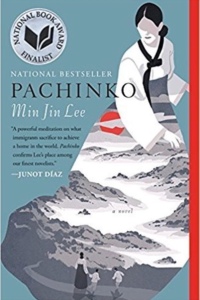
When this book first came out, I remember seeing it in the book store and thinking, “That look’s interesting.” Then my Adventure Book Club (loose name for it) picked it to read earlier last year. However, I was unable to go and didn’t read it. After that, this book was following me everywhere. Whenever I went into a book store, I saw it, or I ran into someone who was reading it or had just read it. I think I was meant to read it. So when my Capital District Book Club picked it for this month, I immediately bought the book, knowing I was going to love it. And I was right.
Lee sets up the book beautifully, opening on a small island where a poor boardinghouse keeper goes about her day-to-day routine keeping the family fed. Yet, despite being poor, the family seems to still enjoy life and genuinely wants to make their guests feel welcome. Don’t get me wrong, you can feel the hardship that the family goes through but to them, it is what it is.
We meet Sunja, the keeper’s daughter, who we find out is pregnant and that’s where this epic saga begins to pick up speed. We quickly find out that Sunja had fallen for a wealthy man who is married and never plans to leave his wife. Sunja quickly marries another man who agrees to take her problem as his own and they move to Japan.
For the rest of the novel, we follow Sunja as she raises her children and the family deals with life-altering events from World War II to the Korean Wars. While these aren’t at the forefront, the economical, social and cultural impacts before, during and after are felt by the family through the hardships they face.
I never realized just how discriminated against Koreans were by the Japanese, a construct that plays throughout the novel and develops into themes of belonging and finding oneself. This is never more evident than in the outcome of Sunja’s children as one decides to take the more “I don’t care, it will never matter” approach while the other longs to fit in and does everything in his power to create a new identity.
If there is one thing about Lee’s style is that her writing envelopes you and you become attached to the characters. You feel their disappointments and the heartache, oh the heartache. Yet while there is heartbreak throughout this book, Lee has a way of hiding little gems throughout that gives the reader a new hope for the characters.
The female characters, particularly Sunja and her sister-in-law, really stayed with me. A question was raised in a recent discussion about this book and whether the females suffer more than the man, but I think it’s equal. The women suffer because the men suffer, but it’s the females that help the family overcome the hardship. They are the ones that persevere. Sunja is an example of that. Right from the beginning I knew Sunja was going to be a foundation of strength after she finds out she is pregnant. She would rather live with the shame of her predicament on her own than with the shame of living as someone’s mistress. Right there I was cheering for her. And she displayed that strength throughout, from resolving her brother-in-law’s debt to working to sell food to support the family. Even despite her own disappointments and heartbreaks, Sunja perseveres.
You have to feel bad for the men in the book because it seemed like nothing they did was good enough and they were always getting the short end of the straw, especially when they cared too much, from Isak to his brother to even Sunja’s sons.
Noa had it the hardest as he struggles to find out where he belongs. He tries to fit in the Japanese culture while holding on to his Korean roots but it becomes to be too much. He realizes that nothing he does will ever be good enough because he will always be Korean. His brother on the other hand realizes this quickly and rather than worry about what others think, he tries to live his life to the fullest though honoraby and honestly. The same can’t be said for Hansu.
I disliked Hansu right from the moment he makes Sunja the offer to become his mistress. The fact that he misled her the way he did had my radar up. Throughout the book, we see his character more and more. While I do believe he genuinely loved Sunja, his actions in showing that love were all wrong. He seriously needed to learn that he couldn’t get a woman the same way he could get a business deal.
I also loved how Lee titled this book Pachinko, a form of gambling that plays out later in the book. I could totally be off base here with what Lee intended but I felt like it played well with the overall theme in this book: Life itself is a risk, a gamble that we take. We never know how it’s going to play out day to day but we continue with the hope that we will win in the end.
I can go on and on about this book. It definitely resulted in a lively discussion during my book club’s meetup last week, filling the entire two hours that we were there. But if you want more, you are just going to have to read the book.


I’ve definitely been meaning to read this too. It sounds like it deals with important issues. Great review!
LikeLiked by 1 person
Thanks!! This was a really good book and everyone in my book club liked it. It’s very rare that everyone likes one book.
LikeLike
[…] on in this family saga from ethnicity and identity to family and loyalty. You can read my full review […]
LikeLike